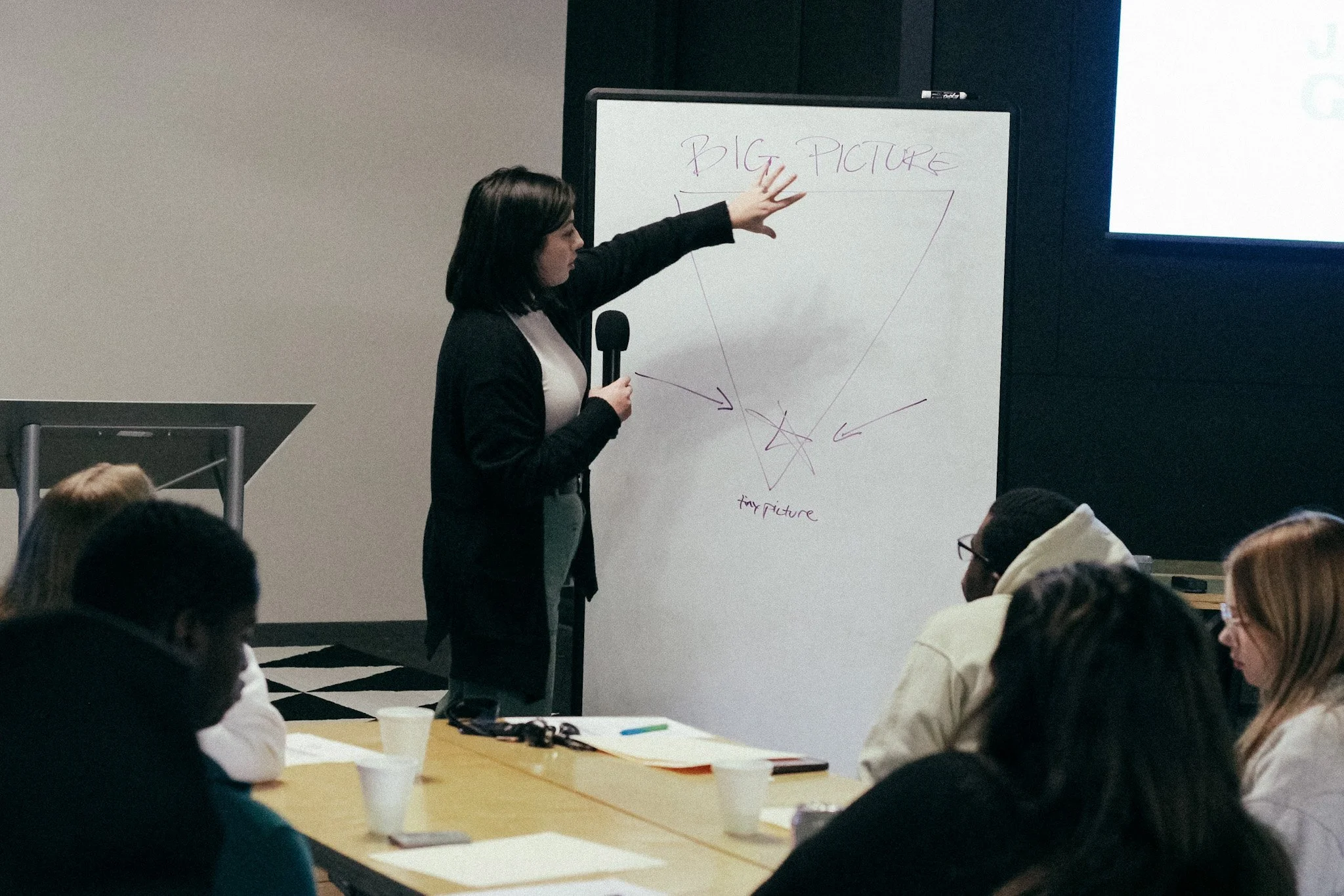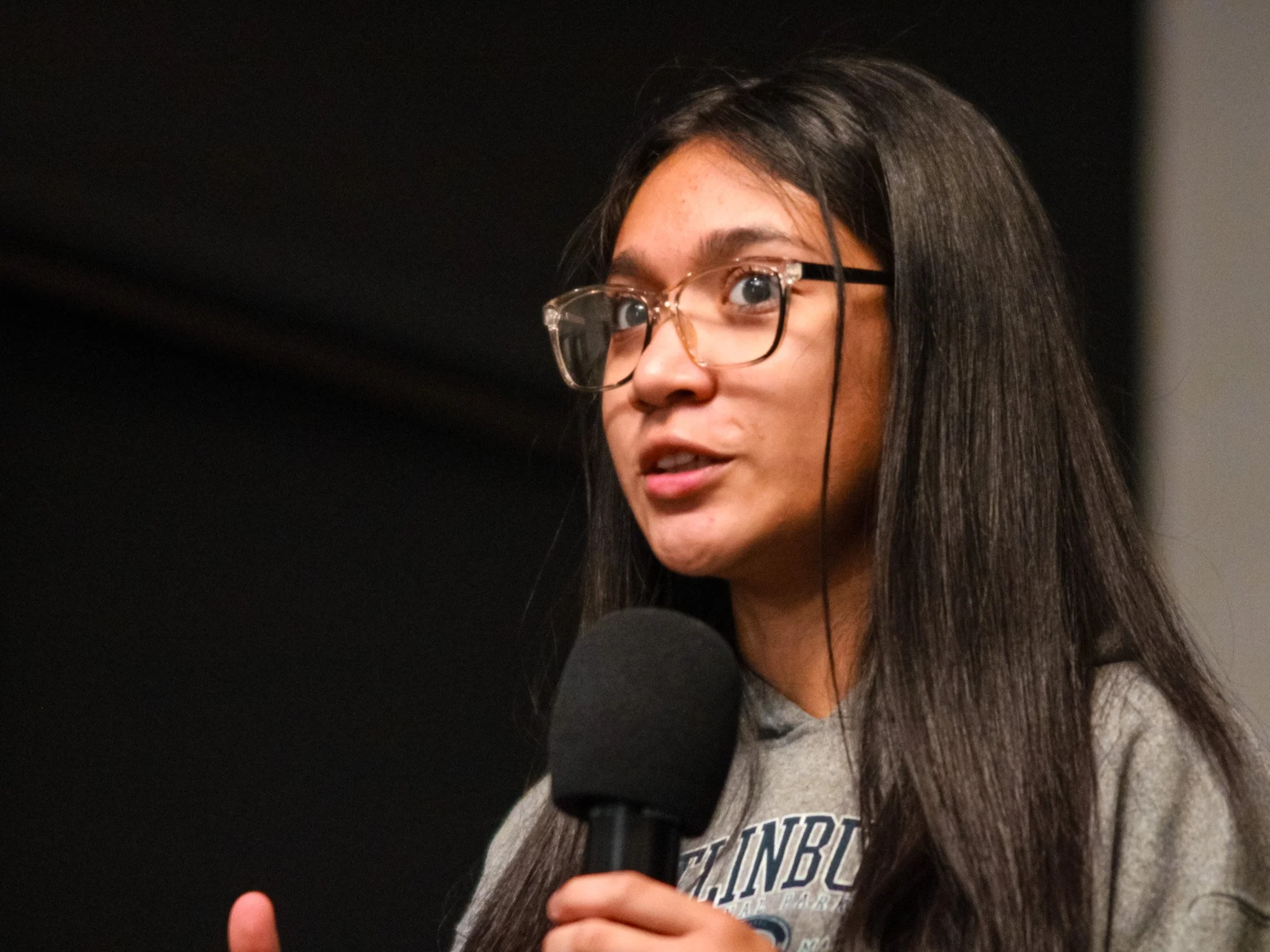Understanding Challenges
“If I had an hour to solve a problem I'd spend 55 minutes thinking about the problem and five minutes thinking about solutions.” - Albert Einstein
All of us face problems and challenges every day at home, work, school, and with our routine day-to-day responsibilities. We also want to solve those problems and challenges as quickly as possible.
In our work lives, whether it is a question on an algebra test or a quarterly accounting report; a research assignment or policy paper; an art project, or a strategic marketing plan, we are all required to deliver answers. We also must communicate those answers to someone “in charge” such as a teacher, a boss, a board, or customers.
Sydnee Cole, Junior Fellow representing Liberty High School speaks at the December Monthly Meeting at theCo.
Too often though efficiency (speed) is valued more than effectiveness (quality). For example, we may face questions like:
As an auto mechanic, do we deliver a car repair quickly or deliver a car repair that will last?
As an engineer, is it better to build more bridges or bridges that are safe?
As a doctor, do we see more patients or give accurate diagnosis?
As a teacher, do we oversee more students or ensure understanding?
Despite the clear need for a reliable car, safe bridge, correct medical assessment or prepared students, people often face pressure to sacrifice the quality of the repair, bridge, assessment or understanding for the quantity of “products” that a particular mechanic, engineer, doctor or teacher can churn out.
Immediate fixes can take precedence over long-term, sustainable solutions. One reason is that delivering solutions demands time. It requires a deep understanding of the problems we are trying to solve. This is hard. This is frustrating. It requires patience. It also requires commitment.
“Solutions are hard because once we analyze a problem, we often confront the reality that the problem is complex, multidimensional and constantly evolving.”
In seeking to understand challenges, we see they are hard not necessarily because of the large amount of information we are required to gather and organize. Anyone can google that. Challenges are hard to understand because once we analyze the information, we often confront the reality that the initial challenge we started with is complex. We see that it is multi-dimensional. We learn that it is, in reality, an ever-evolving mix of many smaller problems. Our challenge is actually “a challenge of challenges” or “a problem or problems”.
Jackson Grown Mentor Summer Nichols listens to Gavin Slaughter, Senior Fellow representing Madison Academic as he presents deconstructs his topic together with Andrew Ellis, Junior Fellow from Madison Academic.
Beginning in September 2022, thirteen select high school students taking part in the year-long Jackson Grown Leader Fellowship have worked hard to dissect and better understand problems and challenges across their communities. Working together with expert mentors from various sectors across Jackson, the Fellows have begun to dig deep into what community challenges they care about, why they care about them as well as the root causes of why they exist.
After the Kickoff event in early September, the following month the Fellows engaged with the idea of Taking Risks. They listened to Heather Larsen, a professional slackliner, as well as Carita Cole, a Jackson Grown Mentor, musician, and Case Manager at West Tennessee Legal Services. Fellows learned that risk was relative and that overcoming fear demanded the courage to take the first step. As a group, we saw that this first step towards overcoming fear of what we might learn or what we might confront was fundamental in engaging with (and ultimately attempting to solve) challenges in the community.
Distinguished Senior Fellow Tim Branch representing Jackson Central Merry High School helps guide the discussion between Fellows and Mentors at the December Monthly Meeting.
In November Greg Perry Jr. a Jackson Grown Mentor and Therapist at Youth Town encouraged the Fellows to consider the strengths in the Jackson community as well as the challenges that exist. He asked the Fellows to reflect on the potential reasons for those challenges. Finally he pushed the students to think about issues and challenges that they particularly care about.
Reflecting on their individual interests, Greg encouraged the Fellows to go beyond the simple “what’s” and dig deeper into the more complex “why’s”. As a group, we saw the students’ passion for addressing challenges such as poverty, violence, homelessness, restorative justice, and mental healthcare. These and other challenges discussed are certainly critical. However, Fellows also began to understand the complexity, components, interconnectedness, and dynamic nature of each of their interests. Together with the team of mentors, Fellows started to deconstruct the challenges they have observed or encountered.
Junior Fellow Omarion Champman representing Jackson Central Merry High School discusses how to analyze issues in the community together with Distinguished Senior Fellow Jocelyn Gargus also representing Jackson Central Merry. Mentor Greg Perry Jr. listens and helps guide the discussion between the Fellows.
In the final meeting of the semester, Olivia Abernathy, Jackson Grown Mentor, Director for Early Education Initiatives at United Way and Bright Start Fellow for West Tennessee region, led the Fellows in their first training session on public speaking. She explained her passion and journey in public speaking. Building on previous sessions with Heather, Carita and Greg she guided the Fellows in techniques and structure for public speaking. She focused specifically on how to present challenges and solutions to community leaders as the Fellows prepare for the 2nd Annual Challenge to the City in Spring 2023.
Jackson Grown Mentor Olivia Abernathy shares her journey into public speaking and community leadership with Fellows.
Far too often we focus on delivering a version of a “solution” that we wager might be “good enough”. Many of us, whether in high school or twenty years deep in a career, are happy with a performance that will check a box. We want to pass the class or we want to keep our job without risking scratching too deep below the initial surface-level challenge. Doing so could pull a thread that might unravel our attempt at a solution.
The extremely hard work of fully understanding a challenge is hard, and often impossible. Efforts like this are often messy. They require a willingness to listen and the courage to not feel like an expert in a topic one assumed they always understood.
Over the course of Fall 2022, the Jackson Grown Leader Fellows representing each high school in Jackson Madison County have demonstrated this courage and humility to understand challenges. In doing so they have also demonstrated the passion to engage and imagine solutions that can serve the entire community.








